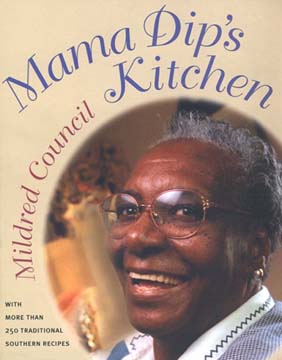 Mama
Dip's Kitchen is the culinary autobiography of a Southern African-American
woman. It is a cookbook, but it is also the story of Mildred Council,
known as Mama Dip, told through the foods that nourished her both physically
and spiritually. Her cookbook contains a range of hearty, simple regional
recipes, made from ingredients such as cornmeal and pork which were
the mainstays of a farming family's diet. Instead of high-class petits-fours,
Council gives a recipe for coconut tarts and adds a practical hint,
"These tarts sell well at school fund-raising events." Council's
food is everyday, hearty, and homey.
Mama
Dip's Kitchen is the culinary autobiography of a Southern African-American
woman. It is a cookbook, but it is also the story of Mildred Council,
known as Mama Dip, told through the foods that nourished her both physically
and spiritually. Her cookbook contains a range of hearty, simple regional
recipes, made from ingredients such as cornmeal and pork which were
the mainstays of a farming family's diet. Instead of high-class petits-fours,
Council gives a recipe for coconut tarts and adds a practical hint,
"These tarts sell well at school fund-raising events." Council's
food is everyday, hearty, and homey.
Many of Council's
recipes are accompanied by a first-person note about the way she and
her family enjoyed that dish, for example Cornmeal "Plumb"
Bread ("I remember this from visiting my aunt and uncle's house")
or Chicken Giblets with Noodles ("This was my children's favorite
meal growing up"). In addition, the book contains a fascinating
autobiographical introduction that defines the context in which Council
invented and enjoyed her recipes. She was born about 1930 in rural North
Carolina and grew up as the daughter of a black sharecropper. In 1974,
once her children were grown, she opened a restaurant with only $64
in her pocket to buy raw materials for breakfast the first day. The
recipes in her cookbook, which she wrote because of the encouragement
of her customers, are her favorites and the ones which made her restaurant
successful. Council loves to cook, especially for other people, and
this book is another way for her to share the joy of food.
The recipes themselves
have instructions which are clear and simple but not incredibly detailed
and assume some foreknowledge of basic cooking techniques. The cookbook's
primary audience is cooks who have enough experience to be comfortable
"winging it" somewhat but not enough to make up the recipes
independently. However, a novice cook should not be daunted by lack
of experience. Council makes it clear that deviation from her recipes
is desirable and encourages experimentation, and she even tells stories
about her own botched experiments. Furthermore, there are no pictures
of the finished product to make the reader-cook feel that his piecrust
isn't as delicate, flaky, or golden as Mama Dip's.
The book is written
in standard American English but contains occasional colloquial turns
of phrase which pleasantly recall the author's Southern voice; for example,
she says that hushpuppies will "cook too slow" if overcrowded.
Recipes are organized by category. The five categories ("Breads
and Breakfast Dishes," "Poultry, Fish, and Seafood,"
"Beef, Pork, and Lamb," "Vegetables and Salads,"
and "Desserts, Beverages, and Party Dishes") might be unintuitive
to some readers, but all recipes as well as major ingredients are also
indexed alphabetically in the back of the book. The index also includes
cross-references; for example, "ground beef" is cross-referenced
to "hamburger." A nice touch is that all recipes can be viewed
in their entirety without turning a page. The paper is of an off-white
color which shows up spills and spatters less than pure white.
At the beginning
of my review I said that Mama Dip's Kitchen was a cookbook and
an autobiography. It also functions in part as a defense of Southern
African-American culture, through the sharing not only of recipes but
of stories of family, love, and happiness. Mama Dip grew up poor but
happy in a family that appreciated the importance of education, and
is now a self-taught entrepreneur who has authored a cookbook of her
own recipes. Mama Dip's Kitchen will teach you not only to cook,
but to enjoy it.


 Mama
Dip's Kitchen is the culinary autobiography of a Southern African-American
woman. It is a cookbook, but it is also the story of Mildred Council,
known as Mama Dip, told through the foods that nourished her both physically
and spiritually. Her cookbook contains a range of hearty, simple regional
recipes, made from ingredients such as cornmeal and pork which were
the mainstays of a farming family's diet. Instead of high-class petits-fours,
Council gives a recipe for coconut tarts and adds a practical hint,
"These tarts sell well at school fund-raising events." Council's
food is everyday, hearty, and homey.
Mama
Dip's Kitchen is the culinary autobiography of a Southern African-American
woman. It is a cookbook, but it is also the story of Mildred Council,
known as Mama Dip, told through the foods that nourished her both physically
and spiritually. Her cookbook contains a range of hearty, simple regional
recipes, made from ingredients such as cornmeal and pork which were
the mainstays of a farming family's diet. Instead of high-class petits-fours,
Council gives a recipe for coconut tarts and adds a practical hint,
"These tarts sell well at school fund-raising events." Council's
food is everyday, hearty, and homey.